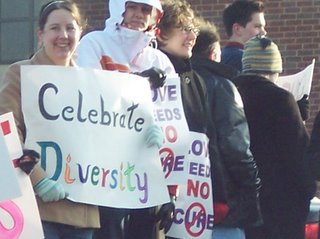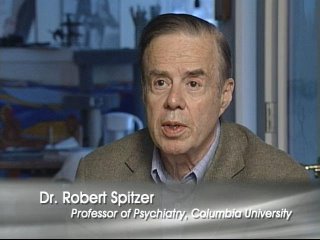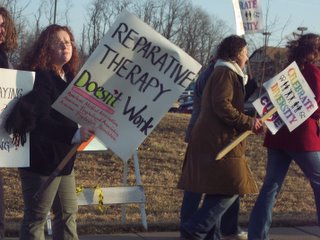Tuesday, February 28, 2006
Older brothers of gay men: All feared and hostile?
Monday, February 27, 2006
Love Won Out St. Louis: A crowd picture
 FYI
FYIThe picture to the left shows just a little of the crowd in front of the Evangelical Free Church. I count about 40 people in this picture in the space of about half a block. This was at 7:48am CST. I think there were about 4 blocks about like this at that time with lots of people walking up and down the street.
Sunday, February 26, 2006
Love Won Out St. Louis: View inside and out


[To the left is a protestor, the police (they were everywhere, and a portajohn supplied by (as I understand it) the church.]
I went to the Love Won Out in St. Louis this weekend as an observer. I will post more about the inside view later, but not tonight as I am nearing sleep. Instead I'll post more pics than comments. I will say that I would guess the estimates of 400 at the protest are pretty accurate, maybe more. It was indeed peaceful when I saw it. It was a pleasure to run into Colleen (CK) who posts here now and then. I was very glad she ran over to my car where I was taking pics of the crowd. I will have more to say about the conference itself in due time.
[To the right: Colleen is asking herself: "who is that weirdo with the camera?"]
Warning: Understatement alert! Reparative therapy was not popular among the crowd.
Wednesday, February 22, 2006
Thinking out loud: Gay and straight pride is just pride
Working with evangelical families who have same-sex attracted members is among the most difficult clinical work I do. Many evangelicals make SSA the unpardonable sin ("thank God I am not like those sinners") and the SSA member wants to pursue a scorched earth, take no prisoners approach ("if you don't accept my truth, then you don't love me and I will never speak to you again"). Both sides wants a change of belief to occur and accuses the other of disloyalty and hatred if the change is not forthcoming. It appears to me that both sides want to fight and win the culture war within my office and within the context of their family. My efforts to normalize disagreement by making it analogous to other behavioral and social issues about which people disagree often fail initially. While most families do gradually grasp on to that concept, living and letting live is like brokering a peace treaty. I think at the moment that I write this that pride in the direction of one's sexual attractions is not healthy self-esteem nor assertively standing up for one's beliefs, it is just pride (or narcissism, if you speak english with a psychological accent).
My work is practically done for me when I speak to a less common set of parents who understand "there but for the grace of God, go I" and gay identified member who says, "I know this is difficult for you, it is difficult for me, remember I didn't ask for these feelings." These families seem to understand quickly that one cannot argue anyone into heterosexuality.
Tuesday, February 21, 2006
Sexual orientation and genetics: X marks the spot
As I look at it, none of this is very enlightening unless the temperament and environment of the sons is also taken into consideration. There are potential intervening variables that are not even considered by these researchers (e.g., gender atypical temperaments). GAT may be related to these changes in the X chromosome but I doubt this was taken into account.
ABSTRACT
Human Genetics
Issue: Volume 118, Number 6
Date: February 2006
Pages: 691 - 694
Extreme skewing of X chromosome inactivation in mothers of homosexual men
Sven Bocklandt, Steve Horvath, Eric Vilain and Dean H. Hamer
Abstract Human sexual preference is a sexually dimorphic trait with a substantial genetic component. Linkage of male sexual orientation to markers on the X chromosome has been reported in some families. Here, we measured X chromosome inactivation ratios in 97 mothers of homosexual men and 103 age-matched control women without gay sons. The number of women with extreme skewing of X-inactivation was significantly higher in mothers of gay men (13/97=13%) compared to controls (4/103=4%) and increased in mothers with two or more gay sons (10/44=23%). Our findings support a role for the X chromosome in regulating sexual orientation in a subgroup of gay men.
Monday, February 20, 2006
Acceptance and commitment therapy
The goal of ACT is to help clients consistently choose to act effectively (concrete behaviors in alignment with their values) in the presence of difficult or interfering private events.
I confess I was not aware of the raging debate within cognitive therapy between ACT therapists (acceptance and commitment therapy) and cognitive therapists until I read a recent Time magazine article about Steven Hayes. The few things I had seen about Dr. Hayes sounded like solution-focused therapy to me. When people ask me what I do I usually say cognitive-behavioral therapy with a nod to solution focused techniques. But in looking at the www.contextualpsychology.org website, I think I may have been doing ACT for quite awhile and not knowing it.
On the SSA front, I only worked on change for a very brief period first starting out. Instead, I have been about pursuing the goal of ACT with my clients who want to be post-gay. That is, I provide a context for clients to choose to act consistent with their values in the presence of SSA. In the process, some of those people experience a significant change in their experience of attraction. Many do not; however, a focus on changing those feelings is considered counterproductive. Rather, the emphasis is on expanding the awareness of agency in achieving an alignment of behavior and values.
Same Sex Attraction and social factors
Same-sex attraction in a birth cohort: prevalence and persistence in early adulthood
Authors: Dickson N.1; Paul C.; Herbison P.
Source: Social Science and Medicine, Volume 56, Number 8, April 2003, pp. 1607-1615(9)
Abstract:
There is a continuing debate about the importance of social versus biological factors in the expression of same-sex attraction. Investigation of prevalence, continuities, and changes over time among young adults growing up in a country with a relatively accepting climate to homosexuality is likely to illuminate this debate. Analyses were therefore undertaken of self-reported same-sex attraction at age 21 and 26, in a cohort of about 1000 people born in 1972/3 in one New Zealand city. Participants were also asked about same-sex behaviour and attitudes to same-sex relationships. By age 26, 10.7% of men and 24.5% of women reported being attracted to their own sex at some time. This dropped to 5.6% of men and 16.4% of women who reported some current same-sex attraction. Current attraction predominantly to their own sex or equally to both sexes (major attraction) was reported by 1.6% of men and 2.1% of women. Occasional same-sex attraction, but not major attraction, was more common among the most educated. Between age 21 and 26, slightly more men moved away from an exclusive heterosexual attraction (1.9% of all men) than moved towards it (1.0%), while for women, many more moved away (9.5%) than towards (1.3%) exclusive heterosexual attraction. These findings show that much same-sex attraction is not exclusive and is unstable in early adulthood, especially among women. The proportion of women reporting some same-sex attraction in New Zealand is high compared both to men, and to women in the UK and US. These observations, along with the variation with education, are consistent with a large role for the social environment in the acknowledgement of same-sex attraction. The smaller group with major same-sex attraction, which changed less over time, and did not differ by education, is consistent with a basic biological dimension to sexual attraction. Overall these findings argue against any single explanation for homosexual attraction.
DOI: 10.1016/S0277-9536(02)00161-2
Affiliations: 1: Department of Preventive and Social Medicine, University of Otago Medical School, P.O. Box 913, , Dunedin, New Zealand.
Some of my critics will no doubt say so what, but I had not thought before about why SSA in women would be more prevalent in New Zealand. Any guesses?
Friday, February 17, 2006
Abortion and Mental Health: A Pro-Life Reaction
Studies Showing Emotional Problems Not Relevant to American Psychological Association's Pro-Choice Advocacy
To: National Desk
Contact: Amy Sobie, for the Elliot Institute, 217-525-8202
SPRINGFIELD, Il., Feb. 17 /Christian Wire Service/
-- According to a spokesperson for the American Psychological Association, the APA's pro-choice position, first adopted in 1969, is based on a civil rights view, not on scientific proof of any mental health benefits arising from abortion.The admission that ideology, not science, governs the APA's support for abortion came in response to a request by a Washington Times columnist for the organization's reaction to a new study linking abortion to mental illness. The study tracked 25 years of worth of data on women born in Christchurch, New Zealand. The researchers had expected that their data, drawn from one of the largest and most comprehensive longitudinal studies in the world, would definitively refute a recent series of studies linking abortion to higher rates of mental health problems.
The Christchurch team, led by a self-professed "pro-choice atheist," Prof. David M. Fergusson, expected to find that any mental health problems occurring after abortion would be fully explainable by prior mental health problems, which some believe are more common among women who have abortions. Instead, the New Zealand research team found the opposite. Even after the researchers controlled for this and numerous other alternative explanations, abortion was clearly linked to elevated rates of depression, anxiety, substance abuse, and suicidal behavior.The findings so surprised Fergusson's research team that they began reviewing the studies cited by the APA in its claims that abortion is beneficial, or at least non-harmful, to women's mental health. The researchers concluded (1) that the APA's publications defending abortion are based on a small number of studies that had major methodological shortcomings (a view that echoes former Surgeon General C. Everett Koop's complaint in 1987 that the research on abortion was too inadequate to draw any definitive conclusions), and (2) that the APA appeared to be consistently ignoring a body of studies published in the last seven years that have shown negative effects from abortion.
The Christchurch team's criticism of the APA's selective and strong assurances of the mental health benefits of abortion prompted Warren Throckmorton, a psychologist and newspaper columnist, to call the APA for comment on Fergusson's criticisms. He was referred to an APA expert and spokesperson on abortion and women's issues, Dr. Nancy Felipe Russo. Russo was among the leaders within the APA who, in 1969, led the organization to adopt an official position in favor of abortion as a civil right. She has subsequently been active in research and advocacy efforts opposing parental notification and mandatory informed consent statutes related to abortion.
APA is Not Neutral on Abortion Science
When asked to comment on the New Zealand study and the pro-choice authors' criticisms of the APA, Russo told Throckmorton that the APA's position on abortion was established on the view that abortion is a civil right. As quoted in Throckmorton's Washington Times column, Russo explained that the Christchurch study would have no effect on the APA's position because "to pro-choice advocates, mental health effects are not relevant to the legal context of arguments to restrict access to abortion."In the first draft of Throckmorton's column, which he sent for comment to another expert on abortion research, Dr. David Reardon of the Springfield, IL-based Elliot Institute, Russo was quoted more bluntly, saying, "it doesn't matter what the evidence says." Throckmorton and Russo subsequently agreed to the clarification of her statement as it appeared in the Washington Times.
According to Reardon, an author of several of the studies on abortion that have been ignored by the APA, Russo's statements "confirm the complaint of critics that the APA's briefs to the Supreme Court and state legislatures are really about promoting a view about civil rights, not science. Toward this end, the APA has set up task forces and divisions that include only psychologists who share the same bias in favor of abortion."
Reardon believes the APA's task forces on abortion have actually served to stifle rather than encourage research. "When researchers like Fergusson or myself publish data showing abortion is linked to mental health problems, members of the APA's abortion policy police rush forward to tell the public to ignore our findings because they are completely out of line with their own 'consensus' statements which are positioned as the APA's official interpretation of the meaningful research on abortion," he said.
When is Relief Not Relief?
Reardon is especially disturbed by what he decries as the "one note" optimism found in position papers by the APA, Planned Parenthood, and other organizations supporting abortion.Among the studies most frequently cited by abortion supporters are those that have asked women to check off a list of feelings they have after their abortions, often within just a few hours, a week, or a month of the procedure. The list may include words like "relief," "regret," "guilt," and "happiness." These studies have found that the most commonly reported reaction after abortion is relief. Indeed, the phrase, "the most commonly reported reaction is relief," frequently shows up in information and consent forms for abortion."All the emphasis on women experiencing relief is misleading because most women reporting relief also report negative reactions," Reardon said. "Indeed, when you add up the number of women reporting negative reactions, it regularly exceeds the number of women reporting relief."
The problem, Reardon says, is that while statistics on "relief" may have value in marketing or lobbying for abortion, they have little or no value as a scientific measure. "Women are simply presented with this single word," he said. "So women who feel relief that they survived an unpleasant surgery, relief that they will no longer face their boyfriend's badgering to have an abortion, relief that they are no longer having morning sickness, or relief from any number of other stresses, are all lumped into the same category, even though their experiences are different. Lumping all forms of relief together helps to makes it sound like most women are reporting that abortion has fundamentally improved their lives, but it's a sloppy and misleading data variable. In fact, when you really look at the data, most of the very same women who are reporting 'relief' are also reporting grief, shame, traumatic reactions, or other negative feelings."
"Thirty-five years ago, when the APA joined in the effort to legalize abortion, they were promising more than just 'relief,'" he added. "They were insisting that abortion would fundamentally improve women's mental and physical health by sparing them the burden of unwanted children. But 38 million abortions later, there is still not a single statistically-validated study that has shown that abortion has actually improved the lives of women who abort compared to those who carry to term."Instead, if you look at the data instead of consensus opinions, depression rates are up, not down, among women who have had abortions. Suicide and substance abuse are up, not down. Premature deliveries are up, not down. But instead of including this data in their statements on abortion, the APA's self-selected panels of abortion advocates continue to distract the media from the all hard evidence linking abortion to higher rates of suicide, substance abuse, depression and anxiety by promoting meaningless statistics about relief."
Reardon says he is thankful that Russo has finally helped to call attention to the fact that the APA's position on abortion is principally based on a commitment to defend abortion as a civil right. But this admission, he says, "should be weighed in light of criticisms against the trend toward 'consensus science' as a means of influencing politics. As one critic, best-selling author Dr. Michael Crichton, creator of Jurassic Park and ER, has succinctly observed: 'The work of science has nothing whatever to do with consensus. Consensus is the business of politics.'"
Sources:
David M. Fergusson, L. John Horwood, and Elizabeth M. Ridder, "Abortion in young women andsubsequent mental health," Journal of Child Psychology and Psychiatry 47(1): 16-24, 2006.
Warren Throckmorton, "Abortion and mental health," Washington Times, January 21, 2005.
David, H., " Retrospectives" From APA Task Force to Division 34," Population & Environmental Psychology Bulletin 1999, 25(3):2-3.
Thursday, February 16, 2006
An apology accepted
I find it interesting that you use a higher education email account to communicate such rhetoric. Does Grove City College know that you use their email account in such a manner? You are an educator??
Of course some of the regular readers and critiquers of this blog have wondered the same thing.
I complained to the DHHS about the email and after about a week the website was taken down and is still down I believe. I learned later that the person responsible was no longer in the position and I thought the matter was settled.
A few days ago I received an email from the link on my website that came from the mystery person who sent email I printed above. I did not expect this but the person involved apologized for her rude email. She wanted her name withheld but here is the email she sent.
Hi Dr. Throckmorton, this is not exactly a question...more of an apology. My name is ___ and I used to work at NCADI (National Clearinghouse for Alcohol and Drug Information). You and I traded a few emails. I would like to apologize to you for my rude emails to you regarding the LBGT site. I had no idea that such a site existed; I had not been informed by anyone at NCADI that this site was up and running AND asking for feedback. I received numerous emails regarding that site and I had no idea what everyone was talking about until I asked a requestor what site he was referring to. He sent me the link and when I went to it I was horrified-not by the site but by the fact that there was an "invitation" to leave your feedback. I was mortified when I realized that we (NCADI) were asking for feedback and that I was dismissive of it. Not that that is an excuse for my emails, I was being defensive because I thought this was a bunch of malicious people attacking my companies web site. The point is, whether or not I agree with any of it I never should have attacked the feedback that was requested. I wanted to apologize as soon as I found out but was told by my supervisor to "not contact you under any circumstances." Since I no longer work there I wanted to take this opportunity to tell you that I am very sorry for the rude emails. It is not something I have ever done before and something I will never do again. Please accept my deepest apologies.
I wrote back and accepted her apology. It is pretty impressive for her to look me up and make the contact.
Tuesday, February 14, 2006
What does change mean?
I have met people who say they were completely unattracted to women, attracted to men and now completely unattracted to men and attracted to women. However, I have met many people who kind of switched emphases: they were mostly homosexual with some heterosexual attractions and are now vice versa. Many critics see this as being bisexuals switching home teams. I think this is change.
I also know others who haven't changed their homosexual feelings very much but rather have added heterosexual attractions to their experience. I believe this experience also represents change.
Still others have had no change in homosexual attractions and little or no addition of opposite sex attraction and yet they commit to following the teaching of their faith which forbids all sexual expression outside of marriage. A person who makes that commitment certainly has had a changed mind.
In short, change means different things for different people. Inasmuch as ministries and conservative groups promote change, I would like to see them be more specific about what change means. I would also like to see critics of post gay people be less dismissive of their choices.
Friday, February 10, 2006
Brokeback Syndrome?
Tuesday, February 07, 2006
Video clip of Dr. Robert Spitzer discussing sexual orientation research

View a clip of Dr. Robert Spitzer discussing his research regarding sexual orientation. The clip is from the documentary, I Do Exist.
Monday, February 06, 2006
New poll on public perceptions of sexuality
50% Believe Choice Plays No Role in Sexual Orientation; 47% Believe "All People Have the Potential to Be Attracted to Members of Both Sexes"
NEW YORK, NY -- (MARKET WIRE) -- 02/06/2006 -- Half of all Americans believe sexual orientation is "innate, genetic or predetermined by other factors such as environment," a new nationwide Zogby Interactive poll shows. The surprising findings are the topline results of a survey commissioned by Scientific American MIND (SciamMind.com), the magazine that probes the workings of the brain and its impact on behavior.
Just 11% agreed with the statement, "sexual orientation is a conscious choice," while one in three (34%) said they believed that "sexual orientation is determined by both choice and other factors." Six percent were not sure. The margin of error for the survey, which included 4,236 interviews, is +/-1.5 percentage points.
While expressing a widespread belief that orientation is not an active choice, respondents also appeared to believe that sexual orientation occurred along something of a spectrum -- with both straight and gay people having the potential to be attracted to individuals of either sex.
Some 47% of poll respondents, a slight plurality, agreed with the statement, "I believe that all people have the potential to be sexually attracted to members of both sexes." But a distinct majority, 53%, said they believed that "a straight person may occasionally experience sexual attraction to individuals of the same sex." An even higher percentage, 62%, said they believed "a gay person may occasionally experience sexual attraction to individuals of the opposite sex."
Scientific American MIND commissioned the poll to probe public attitudes on the question of "Do Gays Have A Choice?" -- the focus and title of the magazine's article by Robert Epstein exploring recent research on sexual orientation. The article, which is distinct from this survey, appears in the February/March issue of Scientific American MIND, which hits newsstands this week.
The Scientific American MIND poll also found: -- The belief that sexual preference is predetermined is widely held across demographic and political lines. It was particularly prevalent among Americans aged 50-64 (53%); single people (59%); Hispanics (57%); and
Democrats (72%).
-- The belief that sexual orientation was either fully or partly a choice
was more widespread among conservative groups. It was especially prevalent
among those who classified themselves as "very conservative" (80%), with
only 15% of that group believing sexual orientation was predetermined.
-- Men and women are deeply divided in their perceptions of sexual
orientation: 60% of females believe it is innate, genetic or predetermined
by other factors such as environment; a far higher percentage than men
(39%).
-- The belief that "all people have the potential to be sexually
attracted to members of both sexes" was especially prevalent among adults
under 30 (66%).
Robert Epstein's article in the new issue of Scientific American MIND, "Do Gays Have A Choice?" explores recent research that suggests that sexual orientation may occur in along a continuum, ranging from exclusive same-sex attraction to exclusive opposite sex attraction. Readers can see where they fall on the spectrum by taking a quiz in the magazine and on its website, SciamMind.com.
Wednesday, February 01, 2006
Some reflections on Brokeback Mountain: The story
I have yet to see Brokeback Mountain. However, I have read the short story and so my comments are based on the brief tale of the same name by Annie Proulx. About the movie, it’s by now like the Gulf Coast to me: I haven’t been there since Katrina but I think I can almost imagine it.
According to the popular press, the movie represents a new genre: gay romantic western. I would agree the short story is a western, but that’s about it. I think by most definitions, the characters are not gay and it does not read like a romance to me.
First of all, the story is not about gay cowboys. Many have pointed out that the two men at the center of attention were sheep herders; but fewer have recognized that the characters, if they can be labeled at all, are closer to bisexual than strictly gay. In the story, the men were portrayed as married and heterosexually responsive. Factor in the main event; two men having intermittent sexual flings, and it is clear the fictional pair were bisexually capable.
The actor who played bisexual sheep herder, Jack Twist, rejected the idea of gayness altogether. Jake Gyllenhaal, in an interview with Details magazine said: "I approached the story believing that these are actually straight guys who fall in love…These are two straight guys who develop this love, this bond. Love binds you, and you see these guys pulling and pulling and tugging and trying to figure out what they want, and what they will allow themselves to have."
In the story, there are some interesting stereotypes. The only relatively good males are the two tragic heroes, Ennis Del Mar and Jack Twist. On the other hand, their fathers are men behaving badly. Ennis' father took his young son to see a dead man beaten unrecognizable for being gay and Jack recalls as a child missing the toilet and being beaten and urinated upon for this transgression.
Speaking of bad fathers, Brokeback Mountain includes a nod to a much maligned theory of causation of homosexuality in men: a distant, rejecting father. Both Ennis and Jack had the kind of dads that psychoanalysts say breed attractions to the same sex. According to same-sex parent theory, these young, hard luck bucks, lonely and unaffiliated, were looking for daddy’s love and found it by "satisfying some shared and sexless hunger" in each other's arms. Out on the mountain, without women but with whiskey, times can get a might lonesome, pardner.
The tag line of the movie poster for Brokeback Mountain intends to teach us that “love is a force of nature.” Rather, I think the Ms. Proulx, perhaps unintentionally, portrays how sometimes the longing for love is also a force of nurture. Whether nature or nurture, the feelings are strong and human. Such well-written emotions compel a belief in their truth.
I realize apologists for the story could accuse me of denigrating homosexual coupling. I mean no such thing. I question the epic significance of male and female pairs engaged in the same kind of furtive search for something beyond the sameness of everyday life. It is the genius of the storyteller that makes finding some kind of tortured magic even plausible in the nexus of such ordinary characters. Every therapist has several Brokeback Mountain scenarios in the case files; they go by titles like the Ett-Mar Motel, the Office Next Door and Choir Practice.
And most of the players in these dramas believe their romance cannot be wrong because it feels so right. The experience of intense persistence, however, does not, in itself, make feelings represent something desirable and good.
This tension between what is and what ought to be is where we learn more about the moral philosophy of those consuming the story than the story itself. When those favorably disposed to gay advocacy watch it, they report a tragic story of love unrealized due to societal homoprejudice. In other words, despite the two broken families, fatherless children and lonely aging, they see the relationship between Jack and Ennis as representing something good, even epic.
Those who focus on the aforementioned negative consequences of the tryst render another moralistic generalization from the story: to wit, homosexuality invariably leads to dead-end relationships and despair.
I submit another point of view. As I read them, Ms. Proulx’s musings represent a reality that some men and women face in their lives. They are attracted to others of the same sex and experience conflict over that fact. For them, the feelings they experience just are. They did not choose or want them, nor do they find much change even with help. Being in circumstances where passion can overcome reflection makes the dilemma all the more raw, intense and, to use a religious word, tempting.
Some people decide that what is must signal what ought to be. Moral philosophers in this vein reason that if nature or God allows something to be felt intensely and changed only with great difficulty, then the experience must have been intended. Reasoning from naturalness has a long history in philosophy, and from reading voluminous reactions to Brokeback, this line of thought has a bright future. Many people seem to think this way.
Others however, do not believe their feelings, no matter how intense, signal anything authoritative about their true nature or the path they are obligated to follow. They believe, on the other hand, that what ought to be is defined for them either by a higher power or loyalty to prior commitments. Such people often populate houses of worship and lament the elevation of feeling over moral sense.
A test: what if Brokeback Mountain featured two men who kept their marital commitments instead of going fishing? Would such a film be reaping a harvest of Oscar nominations?

